| | | | | | | | | | | Axios World | | By Dave Lawler · Sep 01, 2022 | | Welcome back to Axios World. - We'll spend some time tonight (1,900 words, 7 minutes) on the ways America's top adversaries are teaming up. But first, a look at a key partner's relationship with Russia.
- We're off Monday for Labor Day. I hope you get some rest and some sunshine before I'm back in your inbox on Thursday.
New arrival? Subscribe. | | | | | | 1 big thing: The key U.S. partner undercutting Biden's Russia strategy |  | | | Indian Prime Minister Narendra Modi (L) with President Biden at a Quad summit in Tokyo. Photo: Saul Loeb/AFP via Getty | | | | Two global powers are undercutting Western efforts to isolate Russia and deplete the Kremlin coffers as they scale up purchases of Russian oil and join Russia this week in major military exercises. Why it matters: One of those countries is China, which has moved closer to Moscow amid its confrontation with the U.S. The other, though, is India — one of Washington's most valued partners, which has taken a neutral position on Russia's invasion of Ukraine. How it happened: The EU was by far the top destination for Russian oil prior to February's invasion of Ukraine, but EU countries have cut back their purchases and plan to end nearly all imports of Russian oil by year's end. - Even still, Russia's oil revenues are on track to jump by 38% this year, per Reuters. Asked about that projection this week, a White House spokesperson said it had made clear to countries that this is no time for "business as usual with Russia."
- For China and India, it's been far beyond business as usual — they've both dramatically increased their purchases. India accounted for less than 1% of Russia's oil exports prior to the invasion, but was up to 13% by July, helping to offset Russia's lost market share in Europe.
Yes, but: That's due not to politics, but price. Prices from the Gulf have been sky-high, Russia is selling at a discount, and India is trying to keep inflation down and recover economically from the pandemic, Tanvi Madan of Brookings tells Axios. - Indian Foreign Minister Subrahmanyam Jaishankar has called it an "obligation and moral duty" to get the lowest-possible energy prices for Indian consumers. Russia, meanwhile, has praised India for resisting Western pressure.
What to watch: To stop Russia from benefiting from the high oil prices that its invasion helped create, the White House wants to put a price cap on Russian oil. G7 finance ministers will discuss that proposal on Friday. - For it to be effective, they'll need India on board. U.S. Deputy Treasury Secretary Wally Adeyemo visited New Delhi last week and said he'd had "a very constructive conversation" with Indian officials on the cap.
- India has thus far been noncommittal. It stands to benefit from lower prices, but will be wary of provoking Moscow — particularly considering its military's overwhelming reliance on Russian arms.
Zoom out: The long-standing military relationship between India and Russia is on display this week at the Vostok war games in Russia's far east, which will also include China and several other countries. - India's troops will be "full-fledged" participants, not just observers, a source briefed on the matter tells Axios. The source noted that India has taken part in similar exercises in the past but doesn't "always publicize it."
- Asked about India's participation, White House press secretary Karine Jean-Pierre said the U.S. "has concerns about any country exercising with Russia while Russia wages an unprovoked, brutal war against Ukraine."
Between the lines: She avoided any direct criticism of India and dodged a follow-up as to whether the U.S. has pressured India to stop helping Russia, as it has pressured China. - The Biden administration recognizes that India's long-standing relationship with Russia won't fade away overnight, and while it's trying to help New Delhi diversify its arms supply away from Russia, the U.S. priority is deepening coordination in the Indo-Pacific, Madan says.
The bottom line: India is too important to the U.S. strategy toward one top rival, China, to push back too hard as it undermines U.S. policy toward the other. |     | | | | | | 2. U.S. pressure drives Russia, China and Iran closer together | 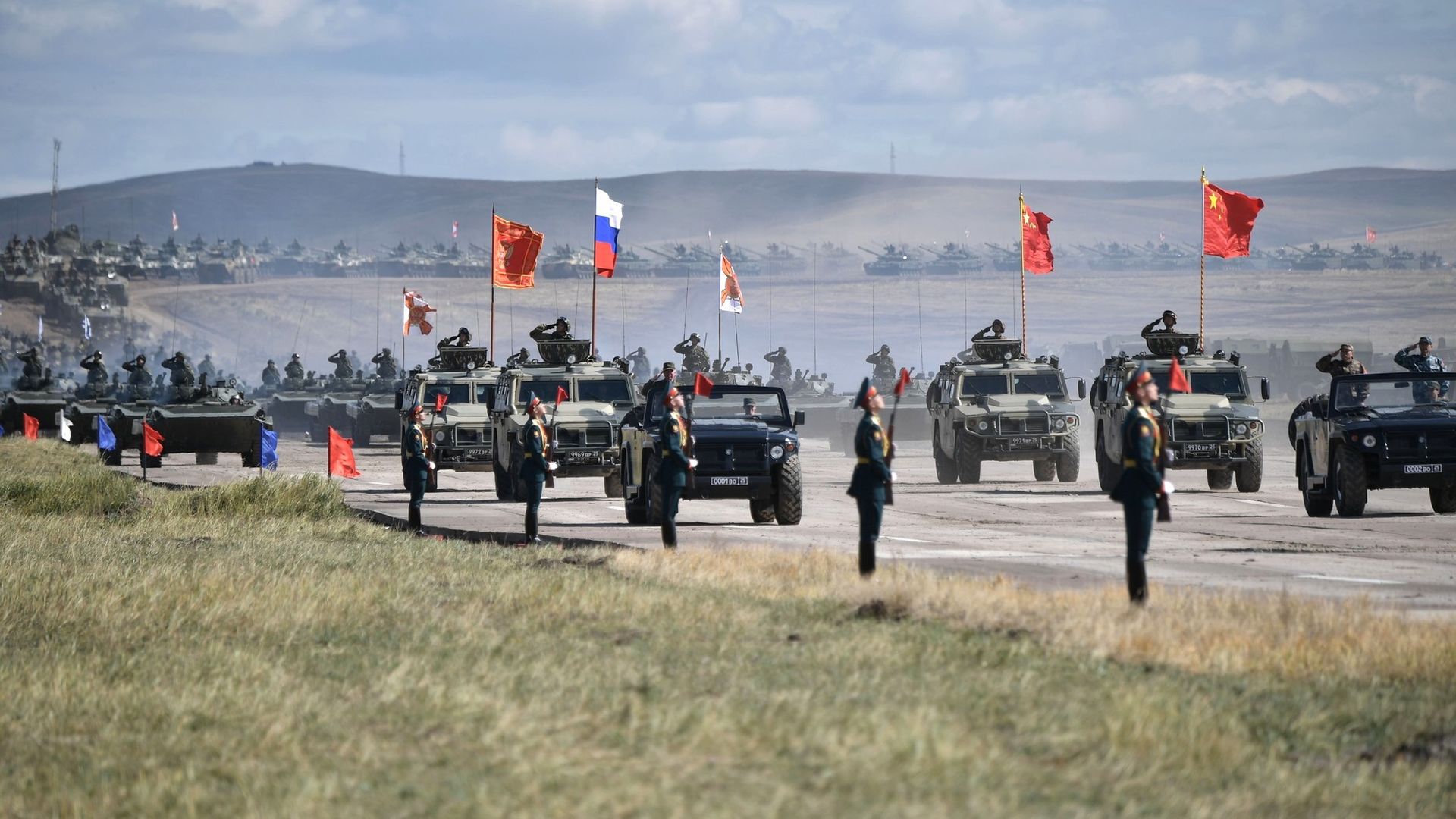 | | | Chinese and Russian forces take part in the 2018 Vostok war games. Photo: Russian Presidency handout via Getty | | | | America's biggest adversaries — China, Russia and Iran — are increasingly teaming up in ways that could undermine U.S. objectives. Driving the news: While China and Russia hold joint military exercises this week, Russia is also deploying an initial batch of drones from Iran on the battlefield in Ukraine. - Those are just the latest examples of America's top geopolitical foes finding common cause.
- Referring to relations with countries like Iran and Russia, a Chinese diplomat tells Axios it's "only natural" that countries facing sanctions and pressure from the U.S. would move closer together.
Where it stands: While Beijing is officially neutral on Russia's invasion, officials and state media have repeatedly blamed it on the U.S. and NATO and refused to criticize the Kremlin. - Moscow, in turn, publicly backed Beijing's muscular response to House Speaker Nancy Pelosi's visit to Taiwan.
- The two powers have also joined forces on a series of recent votes at the UN Security Council, including vetoing U.S.-backed sanctions on North Korea.
- By taking a central role in the Vostok exercises, "China is sending a signal that despite the war and Western pressure on China, the military component of the China-Russia relationship is getting stronger," said Alexander Gabuev, an expert on Russia-China relations at the Carnegie Endowment.
That's also true in terms of trade between the countries, which has increased in value by around 30% this year — helping to ease the blow of Western sanctions - Those sanctions will make Russia even more reliant on China as a customer for its energy and as a source of goods, particularly high-tech products.
Between the lines: While Vladimir Putin and Xi Jinping take every opportunity to emphasize that the relationship has "no limits," it's growing more imbalanced due to China's rise. - Still, Moscow is a valuable source of discounted oil and gas and weapons technology for Beijing, and of irritation for Washington.
- "Just think about the amount of hours that were stolen from [CIA director] Bill Burns, [national security adviser] Jake Sullivan and the president himself that they wanted to spend on China that they have to spend dealing with ... Russia," Gabuev said.
- Yes, but: The war could also strain China-Russia ties as it drags on, as Ali Wyne of Eurasia Group has noted. And China appears not to have crossed the U.S. red line over providing arms to support Russia's war effort.
|     | | | | | | Part II: "A marriage of convenience can be much more durable" |  | | | Russian President Vladimir Putin and Iranian President Ebrahim Raisi stroll in the garden in Tehran. Photo: Iranian Presidency Handout via Getty | | | | Iran has definitely crossed that line. National Security Council spokesperson John Kirby said Wednesday that a first shipment of Iranian drones had been "newly introduced to the fight" in Ukraine. - Iran and Russia have also reportedly been collaborating to evade Western sanctions, a partnership that could undermine U.S. efforts both to impose costs for the Ukraine invasion and to convince Iran to return to compliance with the 2015 nuclear deal.
- While Russia and Iran had cooperated in various areas in the past, they also had disagreements, a Western official said. Now, the relationship is "assuming a more strategic character" because "Russia needs Iran more than before."
China's increased purchases of Iranian oil, meanwhile, are helping to keep the Iranian economy afloat — and undercutting U.S. leverage over Tehran. The big picture: The relationships among these three countries are defined not by deep bonds or shared values, but by specific interests and the mutual desire to challenge Washington. - "A marriage of convenience can be much more durable than a romantic relationship," Gabuev quips.
|     | | | | | | A message from Axios | | NEW: Subscribe to Axios Codebook | | | 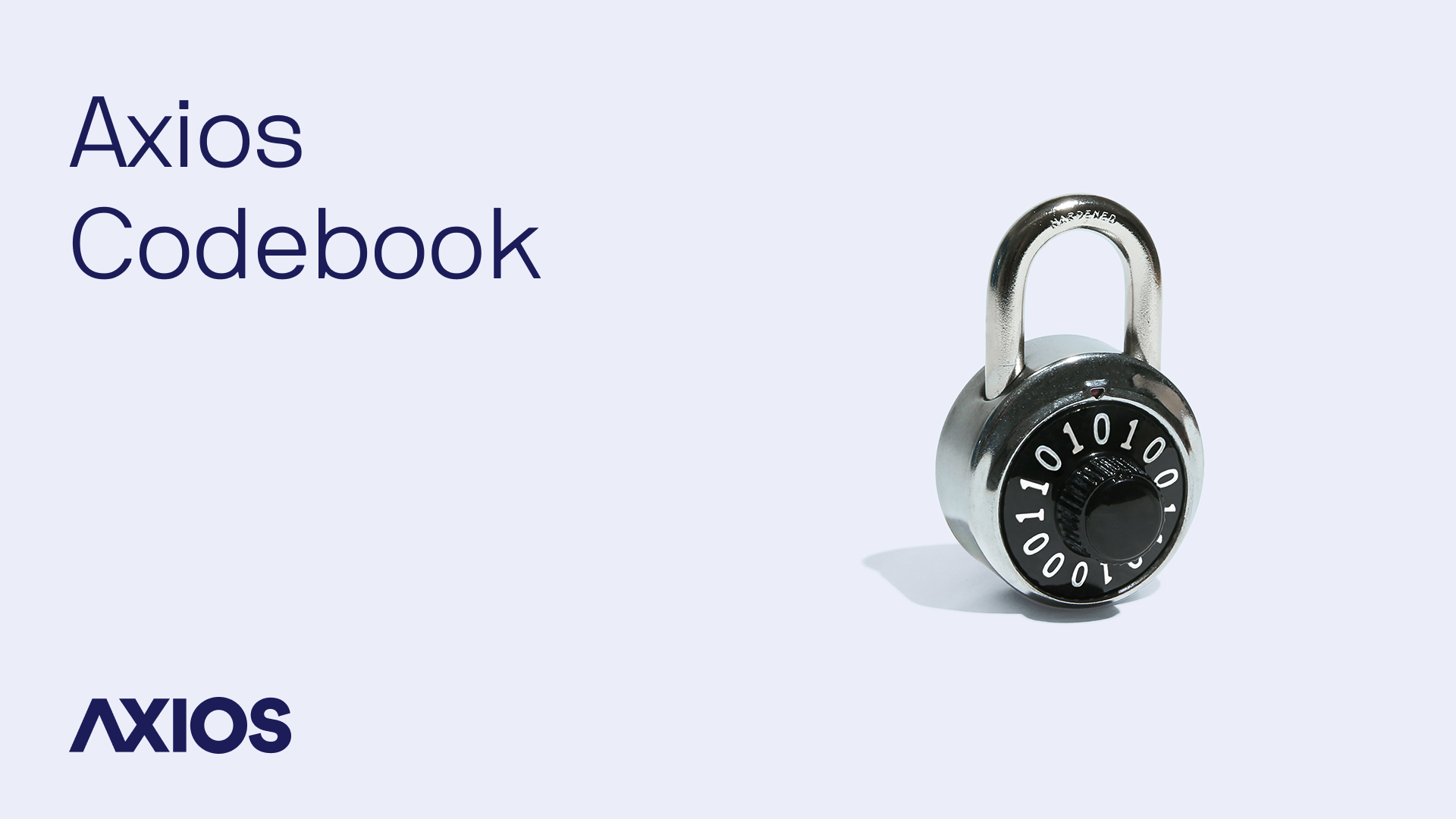 | | | | Decode key cybersecurity news and insights. Dive into breaking news and long-term trends in the field, from ransomware and phishing to privacy and data protection to national security and disinformation. Subscribe for free | | | | | | Bonus: Where in the world? | 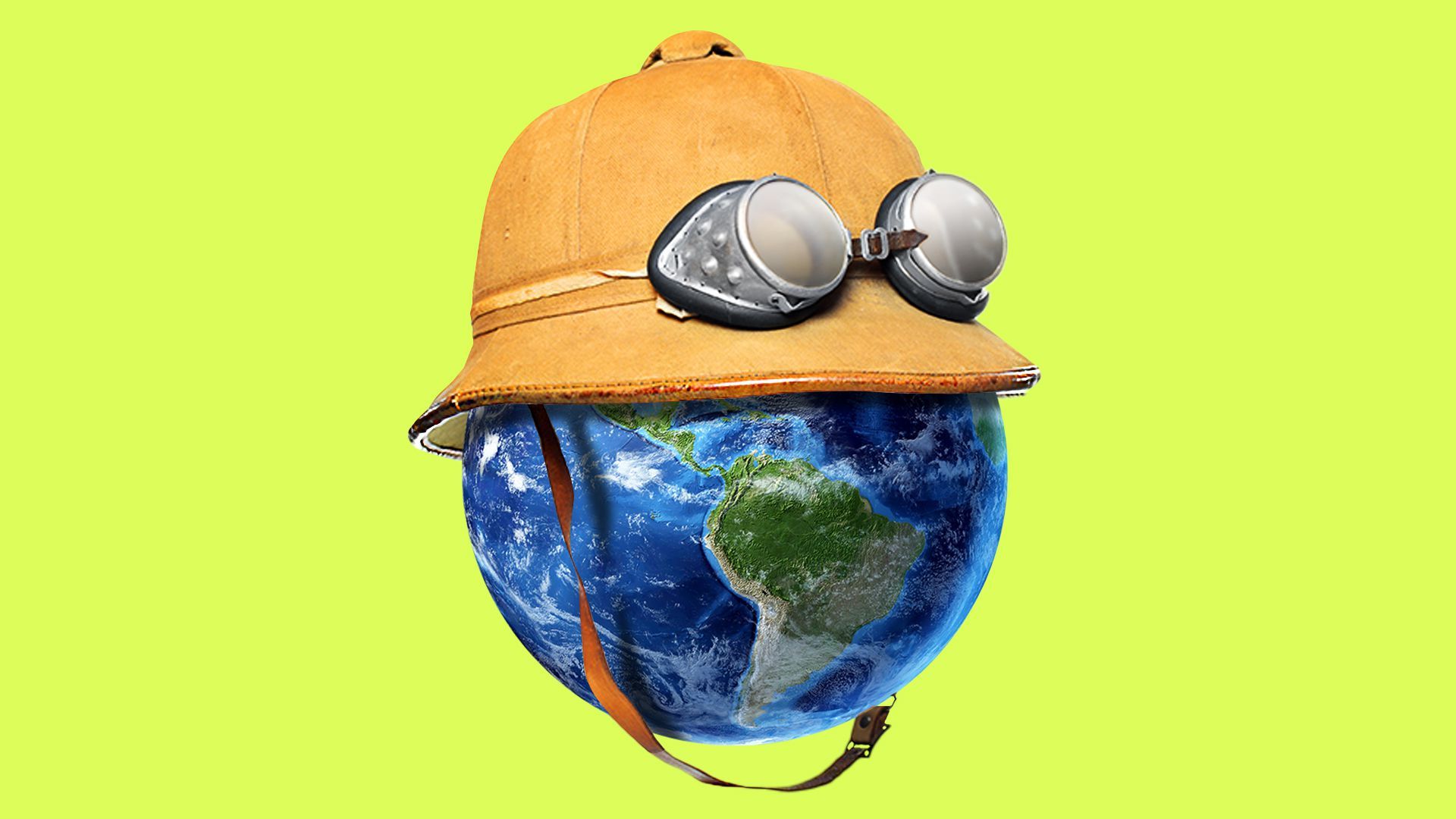 | | | Illustration: Natalie Peeples/Axios | | | | Can you name the two countries to which all five clues apply? - Borders the Pacific Ocean (42 countries left).
- Borders the Atlantic Ocean (11 countries left).
- Does NOT border the Arctic Ocean (8 countries).
- Capital is the country name + "city" (3 countries).
- Does NOT border the U.S. (2).
Scroll to the bottom for the answers. |     | | | | | | 4. Global news roundup | 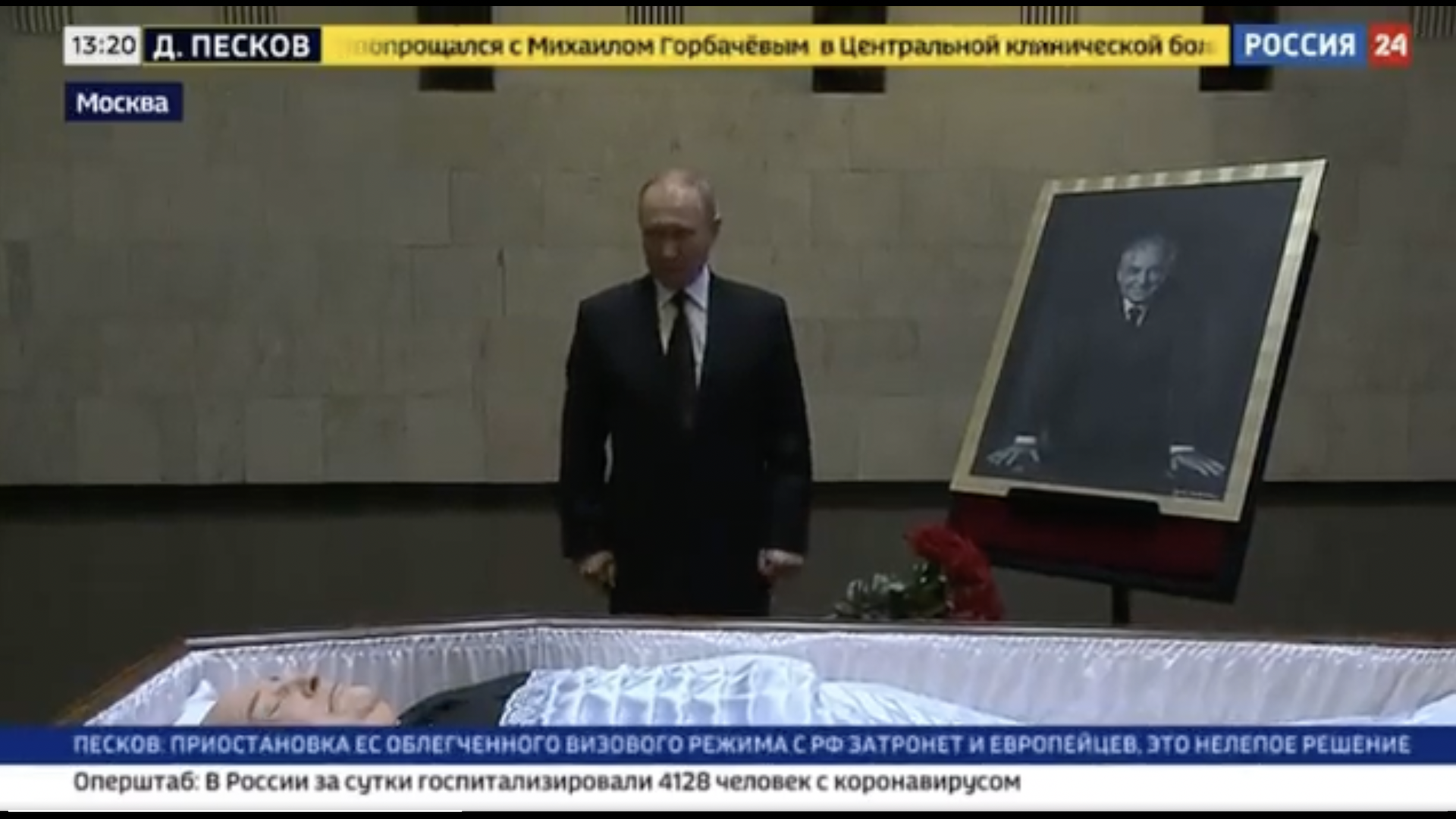 | | | Photo: Screenshot via Russian state TV | | | | 1. Vladimir Putin paid his respects to Mikhail Gorbachev today, but plans to skip the former Soviet leader's funeral, citing his busy schedule. - Gorbachev, who attempted bold reforms upon assuming leadership of the Soviet Union in 1985 and oversaw its dissolution in 1991, died at 91 on Tuesday. Go deeper.
- Gorbachev was "shocked and bewildered" by Putin's invasion of Ukraine, his interpreter of 37 years told Reuters.
2. Ravil Maganov, chairman of Russian energy giant Lukoil, "fell out of the window" of a Moscow hospital to his death today, Interfax reports. - Lukoil expressed concern over the invasion of Ukraine in March (see item 7). Maganov is the latest of at least seven Russian oligarchs to die this year in unexplained circumstances.
3. The UN Human Rights Office released a long-awaited report Wednesday finding that the Chinese government's "serious human rights violations" in Xinjiang could constitute "crimes against humanity." - The report's release was delayed due to strenuous objections from Beijing, and wasn't published until the final minutes of outgoing UN human rights chief Michelle Bachelet's tenure.
4. The U.S. and Iran are inching toward a nuclear deal, but a key sticking point is whether an investigation into Iran's previous undeclared nuclear activity will be closed before it's implemented, as Iran demands. 5. Ethiopia's Tigray region is once again facing full-scale war. Ethiopian and Eritrean troops are reportedly mounting an offensive after the guns had fallen silent for several months. 6. A decade-high 31,000 fires were detected in Brazil's portion of the Amazon rainforest this August. Deforestation already hit record levels during the first half of 2022. |     | | | | | | 5. Data du jour: Climate seen as top global threat |  Data: Pew Research; Chart: Erin Davis/Axios Visuals Pew polled 19 countries on five global challenges, asking participants whether they thought each was a "major threat." - With a median of 75% across the countries, climate change finished first. Those numbers have been steadily increasing (see chart).
Yes, but: Climate change ranked last in the U.S. with 54% considering it a major threat, behind cyberattacks, disinformation, global economic troubles and infectious diseases. |     | | | | | | 6. One to watch: Chile's future on the ballot | 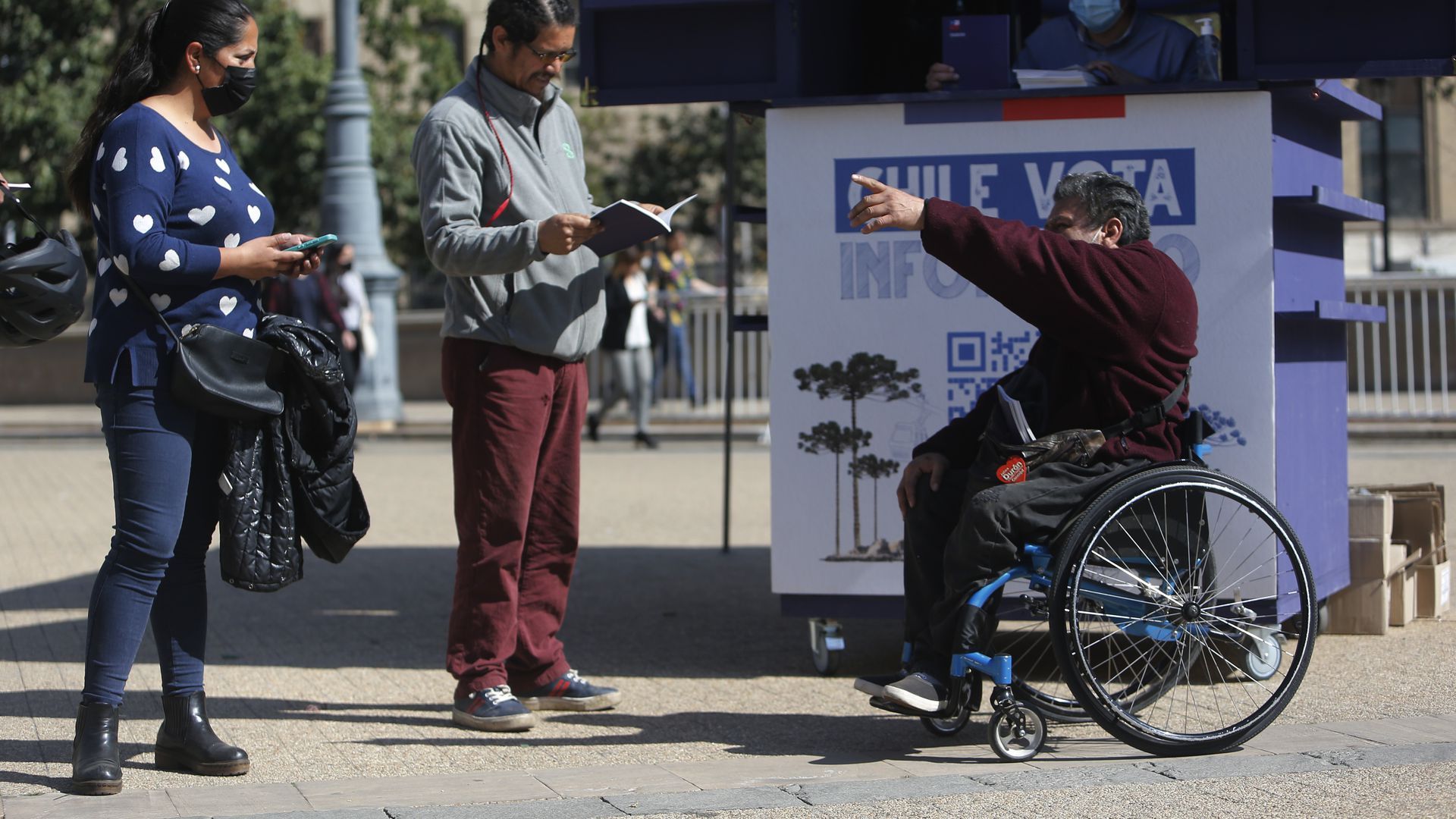 | | | A Santiago resident leafs through a handout copy of Chile's new draft constitution. Photo: Marcelo Hernández/Getty Images | | | | Polls suggest Chileans will likely reject a groundbreaking new constitution in Sunday's referendum. Why it matters: The new constitutional proposal, which tackles climate change and social issues like abortion, is an experiment unlike any in the recent history of the Americas, Axios Latino co-author Marina E. Franco writes. - It was drafted by a diverse group of non-politicians and independents elected to a special assembly, and it's championed by leftist President Gabriel Boric.
- It would enshrine abortion rights, establish a national health care system, recognize access to drinkable water as a human right and give Indigenous tribes greater sovereignty.
- Almost 80% of Chileans voted in October 2020 to start the drafting process after mass protests. But only 37% of voters say they'll back it, with 46% against. Rampant misinformation and economic uncertainty may be driving up the no vote.
What to watch: It's unclear what happens next if the draft is rejected. |     | | | | | | 7. Stories we're watching |  | | | Harvesting grapes in Yemen. Photo: Mohammed Hamoud/Getty Images | | | - Nuclear power's resurgence
- Taiwan shoots down unidentified drone
- U.S. restricts chip sales to China
- Pakistan's "monsoon on steroids" linked to climate change
- Protesters withdraw from Baghdad's Green Zone after deadly clashes
- Guatemala intensifying crackdown on human rights defenders
- Half of world's health facilities lack basic hygiene, WHO finds
- Germany reaches settlement with '72 Olympic attack victims' families
- Poland wants $1.3 trillion from Germany for WWII
- Vatican, for first time, says Russia initiated war with Ukraine
- Japan's PM apologizes for party's links to controversial church
Quoted: "The Board of Directors of Lukoil expresses herewith its deepest concerns about the tragic events in Ukraine. Calling for the soonest termination of the armed conflict, we express our sincere empathy for all victims." — Lukoil board, led by Ravil Maganov on March 3 "This morning Maganov fell out of the window of the Central Clinical Hospital. He died from his injuries." — Source to Russia's Interfax news agency today |     | | | | | | A message from Axios | | NEW: Subscribe to Axios Codebook | | |  | | | | Decode key cybersecurity news and insights. Dive into breaking news and long-term trends in the field, from ransomware and phishing to privacy and data protection to national security and disinformation. Subscribe for free | | | | Answers: Guatemala and Panama |  | | Are you a fan of this email format? It's called Smart Brevity®. Over 300 orgs use it — in a tool called Axios HQ — to drive productivity with clearer workplace communications. | | | | | | Axios thanks our partners for supporting our newsletters. If you're interested in advertising, learn more here.
Sponsorship has no influence on editorial content. Axios, 3100 Clarendon Blvd, Arlington VA 22201 | | | You received this email because you signed up for newsletters from Axios.
Change your preferences or unsubscribe here. | | | Was this email forwarded to you?
Sign up now to get Axios in your inbox. | | | | Follow Axios on social media:    | | | | | |












No comments:
Post a Comment